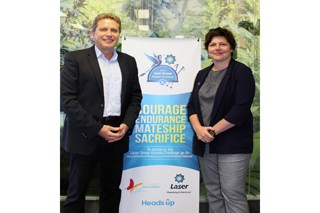Tradies raise $77k for mental health
 As a result of ongoing work by Laser plumbing and electrical to raise both funds and awareness for Beyondblue and the importance of having good mental health in the workplace, the group’s managing director Steve Keil has presented Beyondblue CEO, Georgie Harman with a cheque for $77,479.63.
As a result of ongoing work by Laser plumbing and electrical to raise both funds and awareness for Beyondblue and the importance of having good mental health in the workplace, the group’s managing director Steve Keil has presented Beyondblue CEO, Georgie Harman with a cheque for $77,479.63.
With over 1500 plumbers and electricians including members located throughout Australia, Laser Group is aware that many of the people who make up the business fit into the categories most affected by depression and anxiety.
To tackle this, the business made a strategic decision to partner with Beyondblue and assist where it could while gaining access to tools developed for both individuals and businesses on the headsup website (www.headsup.org.au).
ADVERTISEMENT
Members from the Laser Group, including managing director Steve Keil, walked the Kokoda Track from June 19 to 28.
The Laser Group raised over $125,000 for Beyondblue in 2014, demonstrating Keil’s high regard for the work Beyondblue does and ensuring the Laser Group Members have the information they need to assist with Mental Health in the workplace.
“We know that around 45% of Australians will experience a mental health issue in their lifetime. Construction workers are also more than twice as likely to suicide as other people in Australia. That’s our workplace and we’re not happy about the numbers, so we’re doing what we can to raise funds and awareness by supporting Beyondblue.”
Keil is proud of what the members of the Group have achieved together and excited by the support shown by Laser Group members for Beyondblue.
Beyondblue CEO Georgie Harman said the organisation is grateful to the Laser Group for its outstanding leadership and commitment to good mental health in the workplace, and its generosity and support for Beyondblue’s work.
“We thank the Laser Group for this big donation which will assist us to promote understanding of the signs and symptoms of depression and anxiety and provide direct support to individuals and families. Not only has the Laser Group raised a huge amount of money, but by speaking openly about depression and anxiety, they are helping to break down stigma, both in their workplaces and in the wider community. It is clear that mental health matters to the Laser Group.
“People who need to talk over their worries with a mental health professional can contact our Support Service 24/7 on 1300 22 4636 or via web chat (3PM-midnight AEST) or email at www.beyondblue.org.au/get-support,” Ms Harman said.
Managing Director of Laser Electrical Bendigo, Gary Frank was one of the Members who took part in the Laser Group Kokoda Challenge.
Frank included his first year apprentices as part of his training, blocking out Wednesday afternoons to walk 10 kilometres with them. As well as building up his own fitness, Frank used the time to get to know his apprentices and ensure they were ok, at the same time talking to them about Kokoda and the young men who fought there.
“I wanted to find some of the Kokoda spirit that is found only by being there,” Frank said.
“Having lost a workmate to suicide, this was a great opportunity to raise awareness about the great work beyondblue does.
“Training for Kokoda and using the time to reflect, I know that I’ve changed from this experience and that is a good thing:”
Also completing the Kokoda Challenge was Sean Richardson from Laser Plumbing South Perth. Having lost his mum to melanoma last year, Sean recognised how easy it could be to fall into the trap of depression.
Richardson said: “For me it was the realisation that you never know when you could be affected by depression.”
“Recognising you had depression and accepting that it was okay and that you didn’t have to keep the way you were feeling to yourself is the key to getting rid of the stigma surrounding the illness.”
Statistics from suicide prevention organisation MATES in Construction show people in construction are more than twice as likely to die by suicide than other people in Australia, and that apprentices in construction are two and a half times more likely to suicide that other young men their age.
Remoteness if also a risk factor for suicide, with statistics from Australian Bureau of Statistics (ABS) showing men aged 15-29 living in remote areas are almost six times more likely to die by suicide than those living in city areas.
-
ADVERTISEMENT
-
ADVERTISEMENT

